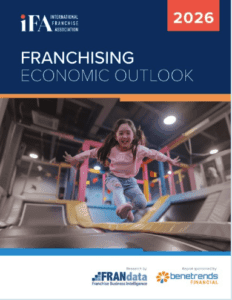Are you thinking about investing in a franchise? Buying a franchise can be one of the smartest ways to own a business, but it also comes with questions that every future owner should ask.
In this blog, we’ll walk through 10 of the most common questions about franchises. These answers will help you understand costs, risks, and opportunities so you can make the best decision for your financial future.

1. What is the franchise granting process?
First, it’s important to know that buying a franchise is not as simple as writing a check. Franchises are awarded, not just sold. This process takes place over several weeks and is a mutual evaluation between the franchisor and the candidate.
During this time, a franchise developer will guide you through presentations covering the brand’s business model, operations, training, technology, and marketing. Only after you have gained this information is it the right time to connect with current franchisees and learn from their experiences.
A critical part of this step is reviewing the Franchise Disclosure Document (FDD). Every franchisor in the U.S. is legally required to provide it. The FDD contains valuable details about the franchise’s costs, obligations, and history. Think of it as a goldmine of information that helps you make a truly informed choice.
2. How much does a franchise cost?
Next, let’s talk about money. One of the biggest misconceptions is that the franchise fee represents the full cost of entry. While fees can range anywhere from $10,000 to $80,000, this is only the beginning.
In reality, you must also consider startup costs, marketing expenses, staff hiring, and (if it’s location-based) build-out and equipment costs. All of these combined make up the total investment. This amount varies widely depending on whether the franchise is home-based, service-based, or location-based with a physical storefront.
3. How can you pay for a franchise?
Once you understand the costs, the next step is figuring out how to fund your investment. Fortunately, there are several options available.
Common methods include:
SBA loans specifically designed for small businesses.
Home equity financing.
Retirement rollovers—by far the most common strategy—allowing you to use retirement savings without penalties or taxes.
Additionally, many franchise candidates work with specialized franchise funding companies. These professionals can walk you through each option and help you identify the funding strategy that best matches your goals and comfort level.
4. How much money can you make?
Understandably, this is the question most people want answered right away. On average, independent businesses take about three years to break even. Franchises, however, often cut this timeline in half. Many reach break-even within 12–18 months, while some succeed even faster.
It’s important to clarify what “break-even” really means. It is the point at which the business earns enough revenue to cover its operating expenses—not necessarily the point where you have recouped your full investment.
Because results vary by industry, brand, market, and owner performance, the best way to set expectations is to speak directly with current franchisees and ask them about their experiences.
5. Which franchises offer the highest earning potential?
Broadly, franchises fall into two categories: location-based businesses and service-based businesses.
Location-based franchises often require larger startup investments and come with higher overhead. As a result, their profit margins tend to be thinner.
Service-based franchises, on the other hand, are usually more affordable to start. They can operate from home or from a modest office, and they deliver higher profit margins. Additionally, one office can often support multiple territories, making them easier and less expensive to scale.
6. How much time will the business demand?
When it comes to time commitment, most franchises—roughly 90%—are owner-operator models. This means the owner is working full-time in the business.
The other option is a semi-absentee model, also known as “manage the manager.” In this setup, you may continue your full-time career while hiring a general manager to oversee daily operations. Once the business is established, semi-absentee owners often spend 10–20 hours per week on oversight, compared to the 40+ hours required in an owner-operator role.
7. Can you leverage your existing skills?
Absolutely. The best franchise choice will align with your strengths, interests, and goals.
When evaluating, ask yourself:
How many hours do I want to work?
What tasks do I enjoy—managing people, sales, networking, or operations?
What are my natural strengths, and how can they help me succeed as an owner?
Matching your franchise choice with your skills and lifestyle not only makes ownership more enjoyable but also sets you up for long-term success.
8. How much control will you have as an owner?
This depends on the brand. Emerging franchises tend to allow more flexibility, while established brands often have stricter systems in place.
That said, even within structured systems, you still control vital aspects such as:
The culture of your team.
Local marketing execution.
Leadership and management style.
Strategic growth decisions.
So while operations may be standardized, your leadership is what shapes the business day-to-day.
9. Can you scale into multiple units or brands?
Yes—and many top performers do exactly that. Scaling can mean buying multi-unit agreements (such as three or six locations) or expanding into multiple brands.
Some owners stay within one industry, while others diversify across industries. Scaling allows you to build wealth faster, reduce risk by spreading it across brands, and create a stronger long-term business portfolio.
10. What are the risks and exit strategies?
Finally, every business carries risk. While franchising greatly reduces it through proven systems and ongoing support, risks still exist—such as economic downturns, rising interest rates, or local rent increases.
The key benefit of franchising is that you are not starting from scratch. You receive training, processes, and support from day one.
As for exit strategies, franchises can be sold just like independent businesses. Some owners choose to cash out, others appoint a manager to run the business, and many pass the franchise on to family members.
Final Thoughts
Buying a franchise is one of the fastest ways to go from employee to business owner. With the right brand, funding, and strategy, you can build a business that provides income, flexibility, and long-term wealth.
By asking these 10 questions, you’ll be better prepared to choose a franchise that fits your goals—and sets you up for success.
Ready to Take the Next Step?
Watch the replay of this episode to dive deeper into these strategies.
Take this free Business Owner Assessment to discover if franchise ownership is the right fit for you.




